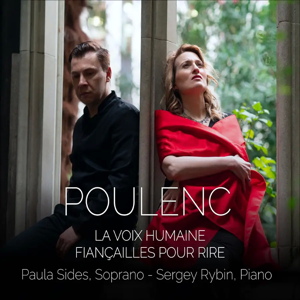
Francis Poulenc (1899-1963)
Fiançailles pour rire (1939)
La voix humaine (1958)
Paula Sides (soprano), Sergey Rybin (piano)
rec. 2023, Potton Hall, Suffolk, UK
Texts and translations included
VOCES8 Records VCM159 [61]
Francis Poulenc set the two works here to words by close friends. Louise de Vilmorin was a poet and novelist, whose melancholy and sometimes acerbic works Poulenc ranked among the best in French literature of the time. His friendship with Jean Cocteau went back to around 1920 when Cocteau assembled a group of young composers, including Poulenc, into the famous Les Six. Soprano Paula Sides, ably accompanied by Sergey Rybin, gives us exciting performances of two works from very different periods of Poulenc’s life.
The cycle Fiançailles pour rire (betrothal for laughs) to poems of Louise de Vilmorin is a product of the growing seriousness in Poulenc’s output throughout the 1930s. The first song, La Dame d’André (Andre’s lady friend), seems to justify the jocularity of the cycle’s title until one apprehends its troubled undertone. In Dans l’herbe (in the grass),the feeling of tragedy is far more evident, and the growing sense of awareness in the text seems to prefigure La voix humaine. Il vole (stealing away) and Mon cadavre est doux comme un gant (my corpse is soft as a glove) mirror the contrast between the first two numbers: one with varied emotions followed by one more tragic. Violon (violin) demonstrates the poet’s caustic side; that seems to have appealed to Poulenc, because this is perhaps the crown of the cycle. Fleurs (flowers) is an ambiguous but certainly not happy ending.
In 1928, Cocteau wrote a monodrama for the actress Berthe Bovy, La voix humaine (the human voice). It became an international success. One could say that there is a second character: the telephone itself (as in Gian Garlo Menotti’s chamber opera The Telephone) with its constant interruptions. A young woman, only known as Elle (she), is talking on the phone for the last time to her now former lover. Her volcanic range of emotions – including her confession of an attempted suicide the night before, and then a seeming resolution to accept the inevitable – is the work of a master. Perhaps the most affecting moment is when she asks her lover, who is leaving with his new love for Marseilles, not to take her to the same hotel that the two of them had visited so often. The play ends with her begging her lover to hang up, although there is still plenty of ambiguity as to what will happen after the play is over.
One might wonder what music could add to this scenario, but Poulenc makes the story his own. He follows Cocteau’s script closely, but treats the music in an 18th-century manner, alternating arias and recitative. The musical structure is based on a series of motifs, a very unusual choice for Poulenc, and there is more tonal ambiguity than one might expect from him. The result is a forty-minute journey through an emotional whirlwind. (The score requires a somewhat reduced orchestra, but since Poulenc’s death it is also sometimes performed with only piano accompaniment.)
Soprano Paula Sides has been singing Fiançailles pour rire since her student days, so she is obviously an expert, but she puts all her vocal and dramatic gifts into Elle. She takes Poulenc’s musical structure and alternates dramatic effects with restrained, almost exhausted semi-spoken ones. Her abilities perhaps manifest themselves best in the mixture of pathos and resignation that she brings to her pronunciation of the words toi (you) and rien (nothing). Pianist Sergei Rybin brings the same scope of emotions to the accompaniment. He is especially good in the performance of Poulenc’s “empty” chords in parts of La voix humaine. This is a worthy disc.
William Kreindler
Buying this recording via a link below generates revenue for MWI, which helps the site remain free.



















